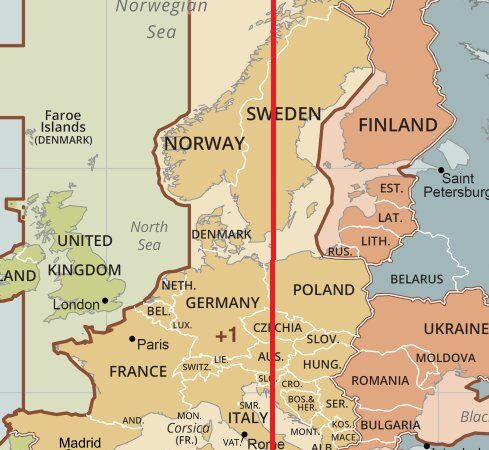If you want to talk about getting rid of the clocks changing, you need to talk about time zones – and then it gets messy

So 84% of Europeans want to stop changing the clocks in spring and autumn. And 3.79% of the German population participated in a European Commission consultation. A summary of the details can be found here.
So stop changing the clocks then!
Hang on, not so fast.
The question then is to stick with Central European Time (i.e. winter time), or Central European Time +1 (i.e. summer time). And then it gets messy. And the European Commission did not ask about that.
From the outset I’d personally be in favour of Central European Time +1 all the time. I am grouchy and useless in the mornings anyway, so it being darker in winter mornings does not bother me. And I am always out and about (especially doing sport) on summer evenings, and – having spent a fair amount of time in Belgium – find the 9.30pm sunset in Berlin already a bit constraining in comparison. Put that forward to 8.30pm in summer and I am not a fan. The Grüne MEP Martin Häusling agrees.
But then I receive this response on Twitter:
https://twitter.com/kirschly/status/1035509244919996416
If these time zones are set so midnight is really the middle of the night, and midday really the middle of the day, then Netherlands, France, Belgium and Spain are actually the ones in the wrong timezones. They ought to be on GMT like the UK.
But even that is not without its controversies, because of the way we live. Our morning routines are more similar, and more time constrained, than our evening routines. If the sun rises at 3.30am rather than 4.30am in summer that makes little difference to anyone, for we are all getting up between 5.30am and 8.30am in the main anyway. But losing an hour of light in the evening does make a difference to how we spend our time – especially in the summer. Then there is the additional issue of when a normal school day, or normal work day, starts and ends – and how those then line up with dawn and dusk.
There’s a long piece in Die Zeit about the clock change issue, trying to make the case that Germany should not stay on summer time all the time, but rather on winter time. That piece takes the example of Russia and their experiments using both their summer time and their winter time when they stopped changing the clocks. But the piece fails to mention Samara Time, i.e. that 4 Oblasts ended up on Moscow +1 and chose to as a result of the decision to no longer change the clocks.
So maybe I should be OK to give up pleasant long summer evenings for the greater good (and to reduce the sleep and health problems, and increases in car crashes that clock changes cause), but as I see it this issue is far from solved – for the issue of whether to change clocks or not is tied up with the issue of what timezone you are in, and whether to stay on summer time or winter time. There I’d wager Europe is a lot further from any consensus!
Last but not least this would all happen post-Brexit, and the UK would of course not have to follow whatever the EU decided to do, also meaning clocks in Dublin and Belfast could be different. I am also just waiting for a Daily Express headline that the EU is taking away Greenwich Mean Time!
[UPDATE 31.08.2018, 1625]
Thanks Joseph for this little gem:
https://twitter.com/JosephGMoran/status/1035532607927271424
I understood that the EC made this proposal almost on the assumption that MS would never be able to agree to a change, and the status quo would thus be maintained. Let’s see. I also suspect that it will be hard to gain a consensus even within member states, as this is a potentially polarising issue. I actually don’t mind changing clocks twice a year, which these days is very easy, in order to optimise both summer and winter time to actual human patterns instead of a rigid and unchanging clock. But people really seem to hate it, so also willing to change if we can somehow gain a semblance of consensus.